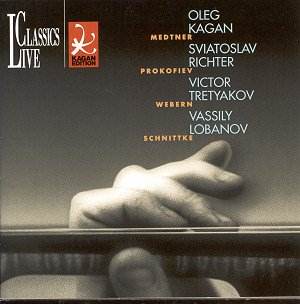Live Classics continues their Kagan edition a wide
ranging and valuable series dedicated to the Tchaikovsky prize-winner
and Oistrakh pupil who died too early of cancer in 1990 at the age of
44. Part of a circle that included his wife, the cellist Natalia Gutman,
violist Yuri Bashmet and pianists Vassily Lobanov and Sviatoslav Richter
amongst others he was known for the catholicity of his repertoire and
his unjaundiced approach to contemporary music. Volume 19 finds him
in congenial company in Moscow concerts spanning the years 1981-1989,
the year before his death. The Medtner Sonatas have never become part
of the established repertory and thats a loss to violinists and audiences
alike. The first is a fluid, elegantly lyrical work of great beauty
to which Kagan responds with fervent understanding. His tone is sweet
but his vibrato is fast and perhaps over tense; this was something of
a handicap especially in his earlier days (the commercial Beethoven
Sonata recordings with Richter were somewhat bedevilled by the vibratos
oscillatory tendencies) and whilst distinctive does tend to limit optimum
tonal expressivity in lyrical passages. Small moments of less than immaculate
playing are not troubling because the contours of the Sonata are firmly
but flexibly delineated. Richter does tend to overpower Kagan in the
balance at certain points in both the first and second movements but
their playing of the third, the Ditirambo is joyfully and delightfully
sympathetic. Medtners own recording with Cecilia Hansen in 1947, never
issued at the time and only recently disinterred, is on APR, a truly
great performance. The Prokofiev teams up Kagan with his exact contemporary,
the redoubtable Victor Tretyakov, whose profile has risen higher in
recent years. They evince good tonal contrasts; Kagan has the more rapid
vibrato, Tretyakov the slower and wider. They respond with conviction
to the elliptical and aggressive qualities of Prokofievs second movement
Allegro and are unafraid to coarsen their tone occasionally in
the interests of narrative meaning. There are real tonal and expressive
depths to parts of the Commodo; the high lying writing here is
more than merely anticipatory of the 2nd Concertos slow
movement in both outline and feeling .The concluding Allegro con
brio is fearlessly played. There are a few off stage bumps this
was recorded in the Pushkin Museum and they are of no significance,
even though the performers are closely miked. Kagan responds as much
to the intellectual voyage of Weberns Sehr Langsam, the first
of the Four Pieces, as he does to the more rhetorical violence of the
last, Bewegt. He plays this very, very near the bridge with resultant
ear-jarring shrillness. Thunderous piano clusters announce the
arrival of Schnittkes Sonata No 1, written for Mark Lubotsky. Its seesaw
sardonicism is fully explored by the violinist and by Lobanov. A suddenly
musing violin, rather beautiful in an abstracted kind of way, accompanies
the big chords of the Largo. Ive always thought that the concluding
Allegretto scherzando was some sort of crazy Broadway musical
show tune gone wrong, Bernstein-Gershwin subverted, for no obvious reason.
I doubt youll hear its pungent drolleries better played. Admirers of
Kagan need not hesitate, whilst devotees of the modern Soviet school
of violin playing will be intrigued by both playing and repertoire;
in fact theres plenty to interest everyone here.
Jonathan Woolf


